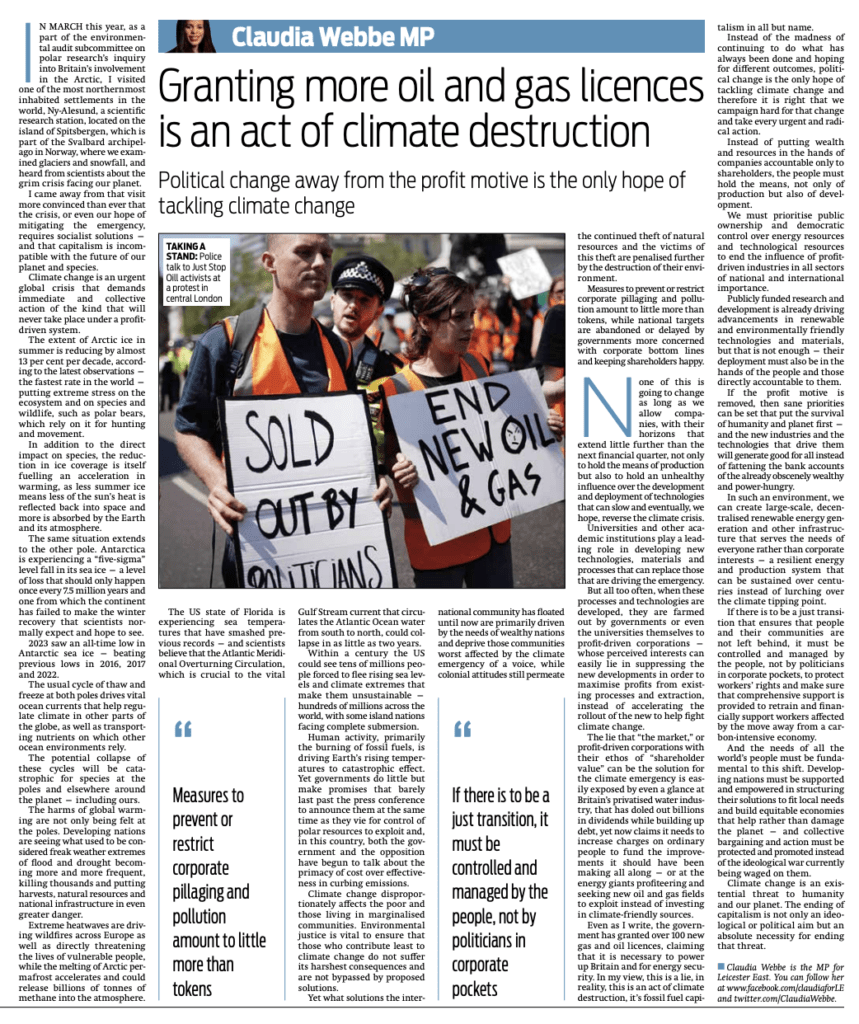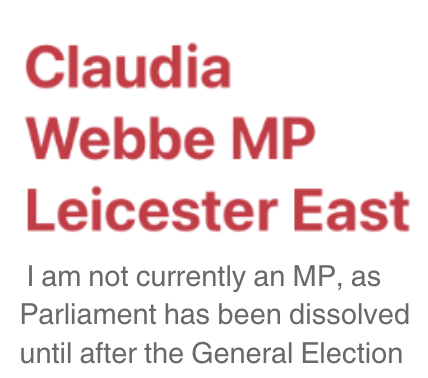
Granting more oil and gas licences is an act of climate destruction
By Claudia Webbe MP
Political change away from the profit motive is the only hope of tackling climate change, argues CLAUDIA WEBBE MP
IN MARCH this year, as a part of the environmental audit subcommittee on polar research’s inquiry into Britain’s involvement in the Arctic, I visited one of the most northernmost inhabited settlements in the world, Ny-Alesund, a scientific research station, located on the island of Spitsbergen, which is part of the Svalbard archipelago in Norway, where we examined glaciers and snowfall, and heard from scientists about the grim crisis facing our planet.
I came away from that visit more convinced than ever that the crisis, or even our hope of mitigating the emergency, requires socialist solutions — and that capitalism is incompatible with the future of our planet and species.
Climate change is an urgent global crisis that demands immediate and collective action of the kind that will never take place under a profit-driven system.
The extent of Arctic ice in summer is reducing by almost 13 per cent per decade, according to the latest observations — the fastest rate in the world — putting extreme stress on the ecosystem and on species and wildlife, such as polar bears, which rely on it for hunting and movement.
In addition to the direct impact on species, the reduction in ice coverage is itself fuelling an acceleration in warming, as less summer ice means less of the sun’s heat is reflected back into space and more is absorbed by the Earth and its atmosphere.
The same situation extends to the other pole. Antarctica is experiencing a “five-sigma” level fall in its sea ice — a level of loss that should only happen once every 7.5 million years and one from which the continent has failed to make the winter recovery that scientists normally expect and hope to see.
2023 saw an all-time low in Antarctic sea ice — beating previous lows in 2016, 2017 and 2022.
The usual cycle of thaw and freeze at both poles drives vital ocean currents that help regulate climate in other parts of the globe, as well as transporting nutrients on which other ocean environments rely.
The potential collapse of these cycles will be catastrophic for species at the poles and elsewhere around the planet — including ours.
The harms of global warming are not only being felt at the poles. Developing nations are seeing what used to be considered freak weather extremes of flood and drought becoming more and more frequent, killing thousands and putting harvests, natural resources and national infrastructure in even greater danger.
Extreme heatwaves are driving wildfires across Europe as well as directly threatening the lives of vulnerable people, while the melting of Arctic permafrost accelerates and could release billions of tonnes of methane into the atmosphere.
The US state of Florida is experiencing sea temperatures that have smashed previous records — and scientists believe that the Atlantic Meridional Overturning Circulation, which is crucial to the vital Gulf Stream current that circulates the Atlantic Ocean water from south to north, could collapse in as little as two years.
Within a century the US could see tens of millions people forced to flee rising sea levels and climate extremes that make them unsustainable — hundreds of millions across the world, with some island nations facing complete submersion.
Human activity, primarily the burning of fossil fuels, is driving Earth’s rising temperatures to catastrophic effect. Yet governments do little but make promises that barely last past the press conference to announce them at the same time as they vie for control of polar resources to exploit and, in this country, both the government and the opposition have begun to talk about the primacy of cost over effectiveness in curbing emissions.
Climate change disproportionately affects the poor and those living in marginalised communities. Environmental justice is vital to ensure that those who contribute least to climate change do not suffer its harshest consequences and are not bypassed by proposed solutions.
Yet what solutions the international community has floated until now are primarily driven by the needs of wealthy nations and deprive those communities worst affected by the climate emergency of a voice, while colonial attitudes still permeate the continued theft of natural resources and the victims of this theft are penalised further by the destruction of their environment.
Measures to prevent or restrict corporate pillaging and pollution amount to little more than tokens, while national targets are abandoned or delayed by governments more concerned with corporate bottom lines and keeping shareholders happy.
None of this is going to change as long as we allow companies, with their horizons that extend little further than the next financial quarter, not only to hold the means of production but also to hold an unhealthy influence over the development and deployment of technologies that can slow and eventually, we hope, reverse the climate crisis.
Universities and other academic institutions play a leading role in developing new technologies, materials and processes that can replace those that are driving the emergency.
But all too often, when these processes and technologies are developed, they are farmed out by governments or even the universities themselves to profit-driven corporations — whose perceived interests can easily lie in suppressing the new developments in order to maximise profits from existing processes and extraction, instead of accelerating the rollout of the new to help fight climate change.
The lie that “the market,” or profit-driven corporations with their ethos of “shareholder value” can be the solution for the climate emergency is easily exposed by even a glance at Britain’s privatised water industry, that has doled out billions in dividends while building up debt, yet now claims it needs to increase charges on ordinary people to fund the improvements it should have been making all along — or at the energy giants profiteering and seeking new oil and gas fields to exploit instead of investing in climate-friendly sources.
Even as I write, the government has granted over 100 new gas and oil licences, claiming that it is necessary to power up Britain and for energy security. In my view, this is a lie, in reality, this is an act of climate destruction, it’s fossil fuel capitalism in all but name.
Instead of the madness of continuing to do what has always been done and hoping for different outcomes, political change is the only hope of tackling climate change and therefore it is right that we campaign hard for that change and take every urgent and radical action.
Instead of putting wealth and resources in the hands of companies accountable only to shareholders, the people must hold the means, not only of production but also of development.
We must prioritise public ownership and democratic control over energy resources and technological resources to end the influence of profit-driven industries in all sectors of national and international importance.
Publicly funded research and development is already driving advancements in renewable and environmentally friendly technologies and materials, but that is not enough — their deployment must also be in the hands of the people and those directly accountable to them.
If the profit motive is removed, then sane priorities can be set that put the survival of humanity and planet first — and the new industries and the technologies that drive them will generate good for all instead of fattening the bank accounts of the already obscenely wealthy and power-hungry.
In such an environment, we can create large-scale, decentralised renewable energy generation and other infrastructure that serves the needs of everyone rather than corporate interests — a resilient energy and production system that can be sustained over centuries instead of lurching over the climate tipping point.
If there is to be a just transition that ensures that people and their communities are not left behind, it must be controlled and managed by the people, not by politicians in corporate pockets, to protect workers’ rights and make sure that comprehensive support is provided to retrain and financially support workers affected by the move away from a carbon-intensive economy.
And the needs of all the world’s people must be fundamental to this shift. Developing nations must be supported and empowered in structuring their solutions to fit local needs and build equitable economies that help rather than damage the planet — and collective bargaining and action must be protected and promoted instead of the ideological war currently being waged on them.
Climate change is an existential threat to humanity and our planet. The ending of capitalism is not only an ideological or political aim but an absolute necessity for ending that threat.
Claudia Webbe MP is the member of Parliament for Leicester East. You can follow her at www.facebook.com/claudiaforLE and twitter.com/ClaudiaWebbe


